人教新目标九年级英语Unit12重要知识点与考点详解
新人教版九年级上册英语第十二单元必考知识点归纳

新人教版九年级上册英语第十二单元必考知识点归纳Unit12Lifeisfulloftheunexpected.【重点短语】taeashoer淋浴leaveybacpacathoe把背包忘在家里getbactoschool返回学校startteaching开始教学gooff响铃rushoutthedoor冲出房门givesbalift捎某人一程issbothevents错过两个事beabouttodosth正要做某事0.stareindisbeliefat难以置信地盯着1.raiseabovetheburningbuilding从正在燃烧的楼上升起jupoutofbed跳下床3.collecttheathhoeor收数学作业shoup赶到,出现【重点句型】BythetieIgotup,ybrotherhadalreadygottenintheshoer.当我起床时,我哥哥已经进了浴室了。
BythetieIgotoutside,thebushadalreadygone.当我出来时,公汽已经走了。
henIgottoschool,IrealizedIhadleftybacpacathoe.当我到达学校时,我才意识到我把背包忘在家里了。
BythetieIaledintoclass,theteacherhadstartedteaching already.当我走进教室时,老师已经开始讲课了。
BythetieIarrivedattheparty,everyoneelsehadalreadysh oedup.当我到达晚会时,其他的每个人都已经到了。
henheputthenoodlesintothebol,herealizedhehadforgott entoaddthegreenbeans.当他把面条放进碗里时,他意识到他忘了添加绿豆荚了。
Beforeshegotachancetosaygoodbye,hehadgoneintothebui lding.在她得到一个向他告别的机会之前,他已经进入楼房了。
人教新目标版初中英语九年级全册Unit12Lifeisfulloftheunexpected知识点汇总

rush hour 高峰时间 the Christmas rush 圣诞节前的忙碌 4.give sb. a lift 捎某人一程 =give sb. a ride / give a ride to sb. eg: I'm a little late. Can you give me a lift, Dad? give sb. … 的结构 give sb. a hand 给某人帮忙 give sb. a ring 给某人打电话 give sb. a lesson 给某人一个教训 give ab. a chance 给某人一个机会 5.end up missing end up 最终成为,最后处于 后常接动词的ing 形式 eg: We were going to go out, but ended up watching TV at home. miss v.错过;思念 eg:I miss you very much and always think of you. 6.be full of 充满 =be filled with eg: The room is full of terrible smell. 7.be about to...when... 就要……,突然…… eg: He was about to go out when the doorbell rang. 8.wait in line 排队等候 eg: When you are at a bus stop, you must wait in line with others for the bus.
show up (使)看得见,变得明显 Sention B
1.fool n. 蠢人,傻瓜 eg: Don’t be such a fool! vt. 欺骗;愚弄 eg:You can't fool me with that old excuse. 搭配 April Fool’s Day 愚人节 fool sb. into doing sth.欺骗某人做某事
新目标九年级英语unit12知识点汇总
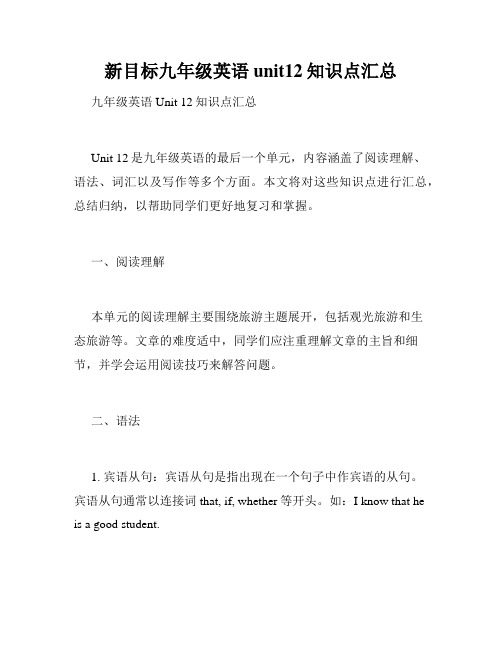
新目标九年级英语unit12知识点汇总九年级英语Unit 12知识点汇总Unit 12是九年级英语的最后一个单元,内容涵盖了阅读理解、语法、词汇以及写作等多个方面。
本文将对这些知识点进行汇总,总结归纳,以帮助同学们更好地复习和掌握。
一、阅读理解本单元的阅读理解主要围绕旅游主题展开,包括观光旅游和生态旅游等。
文章的难度适中,同学们应注重理解文章的主旨和细节,并学会运用阅读技巧来解答问题。
二、语法1. 宾语从句:宾语从句是指出现在一个句子中作宾语的从句。
宾语从句通常以连接词that, if, whether等开头。
如:I know that he is a good student.2. 将来进行时:将来进行时表示将来某个时间正在进行的动作或某个未来的事件。
构成:will be + 动词ing。
如:They will be watching a movie at this time tomorrow.3. 动词不定式的被动语态:动词不定式的被动语态由to be + 过去分词构成。
如:The problem needs to be solved.4. 特殊疑问句:特殊疑问句用来询问某个具体的信息,常见的特殊疑问词有:what, who, when, where, why, how等。
如:What time is it?三、词汇1. 旅游相关词汇:tourist, travel, destination, attraction, guide, sightseeing等。
2. 计量词:本单元涉及了一些计量词,如:a pair of, a group of,a piece of等。
在使用时要注意与名词的搭配。
3. 形容词和副词:学习一些形容词和副词可以丰富语言表达,如:breathtaking, fascinating, slightly等。
四、写作本单元的写作任务是写一篇关于英国旅游的文章。
写作时可以运用所学的词汇和语法知识,通过添加细节和论述观点来丰富文章。
人教版九年级全一册英语 Unit 12 重点语法知识点复习提纲
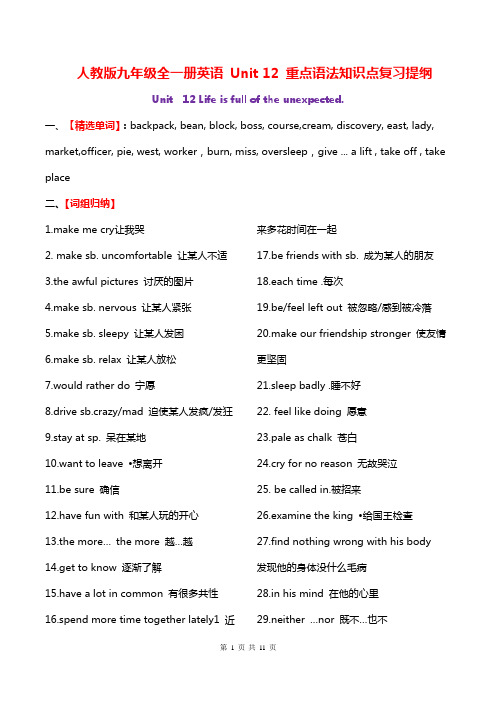
人教版九年级全一册英语Unit 12 重点语法知识点复习提纲Unit 12 Life is full of the unexpected.一、【精选单词】:backpack, bean, block, boss, course,cream, discovery, east, lady, market,officer, pie, west, worker,burn, miss, oversleep,give ... a lift , take off , take place二、【词组归纳】1.make me cry让我哭2. make sb. uncomfortable 让某人不适3.the awful pictures 讨厌的图片4.make sb. nervous 让某人紧张5.make sb. sleepy 让某人发困6.make sb. relax 让某人放松7.would rather do 宁愿8.drive sb.crazy/mad 迫使某人发疯/发狂9.stay at sp. 呆在某地10.want to leave •想离开11.be sure 确信12.have fun with 和某人玩的开心13.the more…the more 越…越14.get to know 逐渐了解15.have a lot in common 有很多共性16.spend more time together lately1 近来多花时间在一起17.be friends with sb. 成为某人的朋友18.each time .每次19.be/feel left out 被忽略/感到被冷落20.make our friendship stronger 使友情更坚固21.sleep badly .睡不好22. feel like doing 愿意23.pale as chalk 苍白24.cry for no reason 无故哭泣25. be called in.被招来26.examine the king •给国王检查27.find nothing wrong with his body 发现他的身体没什么毛病28.in his mind 在他的心里29.neither …nor 既不…也不30.the prime minister 首相31.explain the situation to sb. 向某人解释情况32.have a lot of power 有很大权力33.be worried about /worry about 担心34.lose my power 失去权力35.take one’s position/place 代替某人36.have a lot of wealth 有大量财富37.it’s true that ….是真的38.be followed by 被追随39.top general 大将军40. in three days’time •••三天时间后41.to start with 起初,开始时42.throw rubbish 扔垃圾43.clean up the streets 打扫大街44.get...back 取回,要回45.hand back 发下46. answer well 答的好47.remain unhappy 依然不开心48.a person with power and money 一个有钱有势的人49.search for 搜寻50.even though 即使51.a heavy weight on his shoulders 重担压在肩上52.walk home alone 独自走回家53.the worst day of his life 一生中最糟糕的一天54.stop doing/to do 停止正在做/去干55.think about 考虑56.on the soccer field 在足球场57.miss doing 错过做...58.let sb. down •12.使...失望59.kick sb. off ••开除某人•60.as soon as 一...就61.walk through the door 走过门62.without another word 没有再说一句话63.hear sb. doing 听到某人正在做64.knock on the door 敲门65.let sb. in .让某人进入66.be too hard on sb. 对某人苛刻/严厉67.team effort 团队努力68.the only reason 唯一理由69.support each other.相互支持municate with 同...沟通/交流71. learn from 向...学习72.do sth. with courage ••••有勇气做某事73.rather than 而不是74.fear in his heart 心中的恐惧75.be close to 靠近,接近76.pull together 齐心协力77.to his surprise and relief 令他吃惊和欣慰的78.nod in agreement 点头同意79.not one person's fault 不是一个人的错80.feel lucky to do 感觉幸运地做...81. be on a winning team .在一个会赢的队伍中82.miss a goal .失球83.offer sb. sth.=offer sth. to sb. .给某人提供某物84.be asked to leave 被请求离开85.put so much pressure on sb. ••给某人施加如此多的压力86.work hard together .团结协作,齐心协力87.win /lose a competition 赢/失去比赛88.perform sth. well/badly 表演什么好/坏89.in front of a big group of people 在一大群人面前90.get into a fight with sb. 与某人打架/争吵91. follow me around …到处跟着我 ...三、【重点句式】;1.Life is full of the unexpected. 生活充满了意料之外的事。
人教版九年级英语Unit12单元知识点梳理
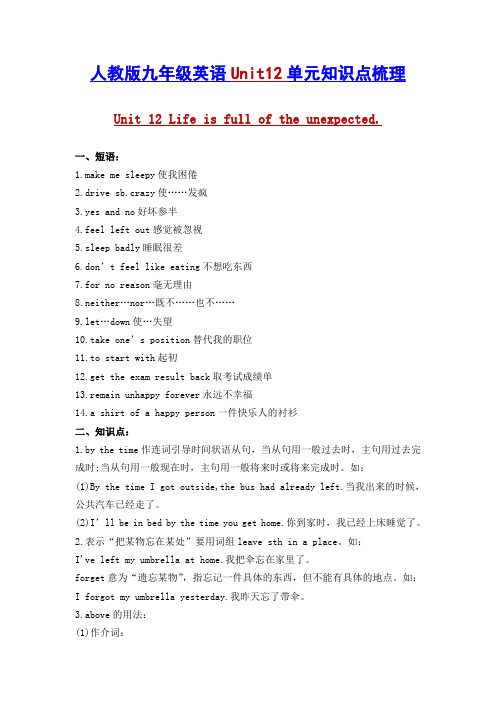
一、短语:1.make me sleepy使我困倦2.drive sb.crazy使……发疯3.yes and no好坏参半4.feel left out感觉被忽视5.sleep badly睡眠很差6.don’t feel like eating不想吃东西7.for no reason毫无理由8.neither…nor…既不……也不……9.let…down使…失望10.take one’s position替代我的职位11.to start with起初12.get the exam result back取考试成绩单13.remain unhappy forever永远不幸福14.a shirt of a happy person一件快乐人的衬衫二、知识点:1.by the time作连词引导时间状语从句,当从句用一般过去时,主句用过去完成时;当从句用一般现在时,主句用一般将来时或将来完成时。
如:(1)By the time I got outside,the bus had already left.当我出来的时候,公共汽车已经走了。
(2)I’ll be in bed by the time you get home.你到家时,我已经上床睡觉了。
2.表示“把某物忘在某处”要用词组leave sth in a place。
如:I've left my umbrella at home.我把伞忘在家里了。
forget意为“遗忘某物”,指忘记一件具体的东西,但不能有具体的地点。
如:I forgot my umbrella yesterday.我昨天忘了带伞。
3.above的用法:(1)作介词:在……上面,如:The moon is above the trees now.月亮现在正位于树梢上。
‚在…之上,超过,如:They are children above six years old.他们是六岁以上的孩子。
新版新目标英语九年级unit12知识点总结.

Unit12 Life is full of the unexpectedSection A1. be full of = be filled with充满,装满2 unexpected adj. 出乎意料的;始料不及的 the unexpected 意外的事情,出乎意料的事the+adj.表示一类人或事物在句中起名词作用有些adj与定冠词the 连用,表示一类人或事物,在句子中起名词的作用 the homeless (无家可归者 the disabled(残疾人The old should be taken good care of by the government.老年人应该被政府好好照顾3. by the time 在……以前,指从过去的某一点到从句所示的时间为止,常引导表示过去的时间状语从句,主句常用过去完成时,即had+动词过去分词。
By the time I got up, he had already left. 当我起床时,他已经离开了。
by now 到现在为止通常与现在完成时连用By now I have collected 200 dolls. 到现在为止,我已收集了二百个布娃娃。
4. leave sth. +地点把某物忘在某处leave → left → left v 离开forget遗忘某物指忘记一件具体的东西,但不能有具体的地点(1leave sth +地点把某物遗忘在某地(2leave for +地点离开去某地(3 leave a message 留言 ask for leave 请假 leave school (中学毕业(4leave one by oneself=leave sb alone 把某人单独留下forget→forgot→fo rgotten v忘记(1 forget sth 忘记某事(不能跟地点状语连用He forgot his grandfather’s name.(2 forget to do sth 忘记去做某事(未做(3 forget doing sth 忘记做过某事(已做5. oversleep =sleep late v 睡过头sleep → slept → slept oversleep—overslept—overslept6.get back to school 回到学校(1get back to 后接表地点的名词,回到某地(2 get back to 后面接人, 回复某人的信件,电子邮件,电话(3 get back 回来,返回,拿回,取回7. go off 发出响声, (闹钟闹响The alarm went off just now. 刚才警钟响了go over 复习 go away 离开 go by (时间过去 go for a walk 出去散步gofishing/shopping/skating/swimming 去钓鱼/去买东西/去溜冰/去游泳8. give sb. a lift =give sb. a ride / give a ride to sb. 捎某人一程9.be about to 忙于;即将做某事。
最新人教版九年级英语第12单元重要知识点总结大全

最新人教版九年级英语第12单元重要知识点总结大全1. 单词和短语- 否定副词:never, hardly, seldom, rarely- 名词短语:a bunch of, a series of, a variety of, a source of- 形容词短语:fed up with, worried about, interested in, tired of2. 语法2.1 过去完成时- 表示在过去某一时间或事件之前已经完成的动作或状态。
- 构成:had + 过去分词。
2.2 宾语从句- 宾语从句用来充当动词或介词的宾语,说明它所作的动作或动作的对象。
- 引导宾语从句的连词:that, whether, if, when, where, why, how 等。
2.3 名词性从句- 名词性从句可以充当主语、宾语、表语或同位语。
- 引导名词性从句的连词:that, whether, if, what, who, whom, which, whose, when, where, why, how等。
2.4 定语从句- 定语从句用来修饰一个名词或代词,并且不能独立存在。
- 引导定语从句的关系代词:that, which, who, whom, whose。
3. 文化知识- 英国文化:英国人最喜欢的体育运动是足球,也称为英式足球。
英国还有伦敦塔、巨石阵等许多著名的文化和历史遗迹。
- 美国文化:美国四个最受欢迎的体育运动是足球、篮球、棒球和冰球。
美国有百老汇和好莱坞等著名的文化产业。
4. 阅读技巧- 阅读理解题:先通读全文,找出文章主旨,然后仔细阅读每一段,根据段落大意进行答题。
- 完型填空题:通读全文,理解上下文的意思,根据句子结构和语法规律进行填空。
- 词汇题:通过上下文的句子理解和推断词义,选择正确的词汇填空。
以上是最新人教版九年级英语第12单元的重要知识点总结。
希望对你有帮助!。
人教版九年级英语第十二单元重要考点总结

人教版九年级英语第十二单元重要考点总结本文档总结了人教版九年级英语第十二单元的重要考点,以帮助学生备考。
1. 词汇与短语- 办法:method, way- 难题:difficult problem- 机械的:mechanical- 物理学:physics- 化学:chemistry- 学科:subject- 实验室:laboratory- 成绩:grade- 研究小组:study group- 选择题:multiple choice question2. 语法与句型- 宾语从句:当它作主句的宾语时,常用it作形式宾语。
例如:I find it necessary to study English every day.- 表语从句:一般用连接代词或连接副词引导。
例如:The problem is how to solve it.- 强调句型:强调主语用it is...that,强调宾语用it例如:It was Jane who won the first prize.- it is no use + 动名词:表示“做某事没有用”。
例如:It is no use crying over spilled milk.3. 句式转换和填空- 主语从句的转换例如:1) No one knows where he went. → Where he went is unknown.- 宾语从句的转换例如:1) She asked if he could help her. → She asked whether he could help her or not.2) Do you know what time it is now? → Can you tell me what time it is now?4. 阅读理解- 词义推测:根据上下文猜测单词的词义。
- 文章主旨:理解文章的中心思想。
- 细节理解:找出文章中的具体细节信息。
新目标英语九年级Unit 12 知识要点归纳-2019年教育文档

新目标英语九年级Unit 12 知识要点归纳【重点词组或短语】 1. go off 响铃 2. give sb.a lift捎某人一程 3. be about to do sth. 正要做某事 4. stare in disbelief at 难以置信地盯着5. raise above the burning building 从正在燃烧的楼上升起6. jump out of bed 跳下床7. collect the math homework 收数学作业8. complete the work for my boss 完成老板的工作9. show up 赶到,出现10. get stressed out 紧张起来11. hand in homework 上交作业 12. take place 发生13. play all kinds of tricks and jokes开各种玩笑14. sell out 卖完,售完15. lose weight 减肥16. by the end of that day 到那天结束时17. end up以……结束 18. get married 结婚19. have a happy ending 有一个幸福的结局20. fear spread across the whole country 恐惧席卷整个国家21. head west 向西前进 22. in the middle of the road在路中间23. turn around 调头、转身24. make an unexpected discovery 有一个出乎意料的发现25. cancel the plan 取消计划 26. lead to 通向27. miss doing sth. 错过做某事【重难点句子】1. I was about to go up when I decided to get a coffee first.我正准备上去,这时决定先喝一杯咖啡。
人教新目标英语九年级全册 Unit 12 Life is full of the unexpected 知识点汇编

【聚焦中考】:Unit12 必考知识点汇编1. By the time I got up, my brother had already gotten in the shower.到我起床的时候,我哥哥已经在洗澡了。
(教材第89页)➢中考链接考查动词时态的用法(黔东南) The bus ______ for five minutes when Tim arived at the station.A. wentB. has leftC. had leftD. had been away【答案】D【解析】when引导的时间状语从句为一般过去时,主句动作leave发生在从句动作arrived之前,即leave发生在过去的过去,需用过去完成时;与时间段连用时,leave要转化为可延续的形式be away。
(襄阳中考) 一We all went to the cinema except you last night. Why didn’t you come?—Because I _______ that movie twice.A. have watchedB. had watchedC. was watchingD. would watch【答案】B【解析】考查动词时态的用法。
根据交际情景可知,我昨晚不去看电影,是因为我以前看过了。
叙述的是“过去的过去”发生的事,用过去完成时,故选B。
2. When I got home, I realized I had left my keys in the backpack.第1页/共7页当我到家时,我意识到我把我的钥匙落在背包里了。
(教材第90页)➢中考链接考查动词leave, forget辨析(滨州)—I’m sorry I ______my exercise book at home this morning.—It doesn’t matter.Don’t forget ______ it here this afternoon.A. left; to takeB. forgot; bringingC. left; to bringD. forgot; to bring【答案】C【解析】leave sth. somewhere是固定搭配,意为“把某物遗忘在某处”,排除选项B和D;take是带走,bring是带来,don’t forget to bring…意为“别忘把……带来”。
unit12知识点精讲精练英语九年级全一册(人教新目标版)
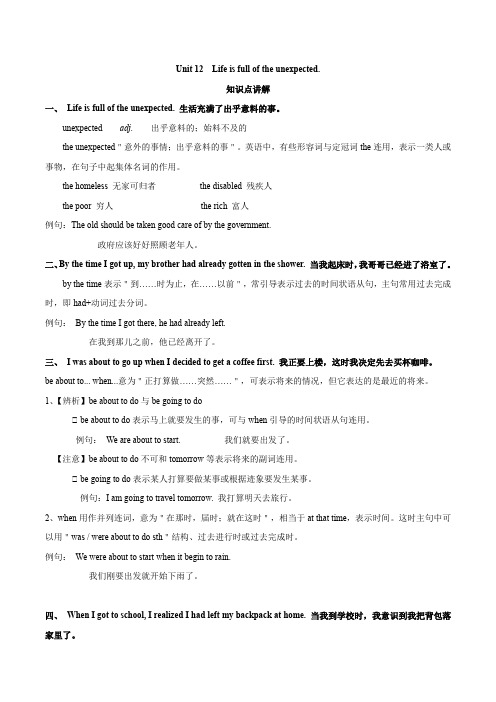
Unit 12 Life is full of the unexpected.知识点讲解一、Life is full of the unexpected. 生活充满了出乎意料的事。
unexpected adj.出乎意料的;始料不及的the unexpected"意外的事情;出乎意料的事"。
英语中,有些形容词与定冠词the连用,表示一类人或事物,在句子中起集体名词的作用。
the homeless 无家可归者the disabled 残疾人the poor 穷人the rich 富人例句:The old should be taken good care of by the government.政府应该好好照顾老年人。
二、By the time I got up, my brother had already gotten in the shower. 当我起床时,我哥哥已经进了浴室了。
by the time表示"到……时为止,在……以前",常引导表示过去的时间状语从句,主句常用过去完成时,即had+动词过去分词。
例句:By the time I got there, he had already left.在我到那儿之前,他已经离开了。
三、I was about to go up when I decided to get a coffee first. 我正要上楼,这时我决定先去买杯咖啡。
be about to... when...意为"正打算做……突然……",可表示将来的情况,但它表达的是最近的将来。
1、【辨析】be about to do与be going to do① be about to do表示马上就要发生的事,可与when引导的时间状语从句连用。
例句:We are about to start. 我们就要出发了。
【注意】be about to do不可和tomorrow等表示将来的副词连用。
Unit12重点知识人教版九年级英语全册
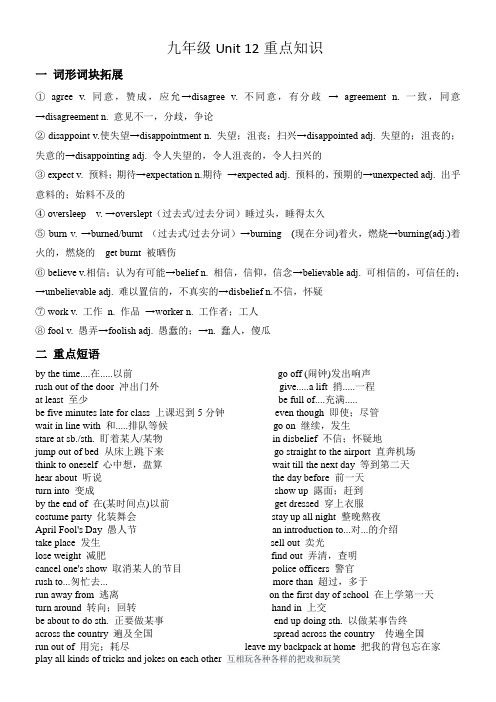
九年级Unit 12重点知识一词形词块拓展①agree v. 同意,赞成,应允→disagree v. 不同意,有分歧→ agreement n. 一致,同意→disagreement n. 意见不一,分歧,争论② disappoint v.使失望→disappointment n. 失望;沮丧;扫兴→disappointed adj. 失望的;沮丧的;失意的→disappointing adj. 令人失望的,令人沮丧的,令人扫兴的③ expect v. 预料;期待→expectation n.期待→expected adj. 预料的,预期的→unexpected adj. 出乎意料的;始料不及的④ oversleep v. →overslept(过去式/过去分词)睡过头,睡得太久⑤ burn v. →burned/burnt (过去式/过去分词)→burning (现在分词)着火,燃烧→burning(adj.)着火的,燃烧的get burnt 被晒伤⑥ believe v.相信;认为有可能→belief n. 相信,信仰,信念→believable adj. 可相信的,可信任的;→unbelievable adj. 难以置信的,不真实的→disbelief n.不信,怀疑⑦ work v. 工作n. 作品→worker n. 工作者;工人⑧ fool v. 愚弄→foolish adj. 愚蠢的;→n. 蠢人,傻瓜二重点短语by the time....在.....以前go off (闹钟)发出响声rush out of the door 冲出门外give.....a lift 捎.....一程at least 至少be full of....充满.....be five minutes late for class 上课迟到5分钟even though 即使;尽管wait in line with 和.....排队等候go on 继续,发生stare at sb./sth. 盯着某人/某物in disbelief 不信;怀疑地jump out of bed 从床上跳下来go straight to the airport 直奔机场think to oneself 心中想,盘算wait till the next day 等到第二天hear about 听说the day before 前一天turn into 变成show up 露面;赶到by the end of 在(某时间点)以前get dressed 穿上衣服costume party 化装舞会stay up all night 整晚熬夜April Fool's Day 愚人节an introduction to...对...的介绍take place 发生sell out 卖光lose weight 减肥find out 弄清,查明cancel one's show 取消某人的节目police officers 警官rush to...匆忙去... more than 超过,多于run away from 逃离on the first day of school 在上学第一天turn around 转向;回转hand in 上交be about to do sth. 正要做某事end up doing sth. 以做某事告终across the country 遍及全国spread across the country 传遍全国run out of 用完;耗尽leave my backpack at home 把我的背包忘在家play all kinds of tricks and jokes on each other 互相玩各种各样的把戏和玩笑三.Grammar过去完成时1.When I got to school, I realized I had left my backpack at home.2.By the time I got back to school, the bell had rung.3.But before I got to the bus stop, the bus had already left.Summary:1)意义:过去完成时表示过去某个时间或某个动作____发生的动作,它表示动作发生的时间是“________________”,它是一种相对于___________的时态,没有_________________就没有过去完成时态。
人教版九年级英语第十二单元Unit12知识点+习题
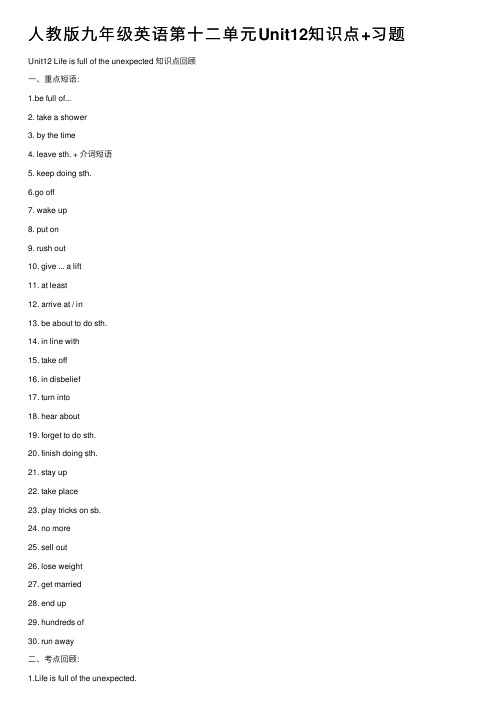
⼈教版九年级英语第⼗⼆单元Unit12知识点+习题Unit12 Life is full of the unexpected 知识点回顾⼀、重点短语:1.be full of...2. take a shower3. by the time4. leave sth. + 介词短语5. keep doing sth.6.go off7. wake up8. put on9. rush out10. give ... a lift11. at least12. arrive at / in13. be about to do sth.14. in line with15. take off16. in disbelief17. turn into18. hear about19. forget to do sth.20. finish doing sth.21. stay up22. take place23. play tricks on sb.24. no more25. sell out26. lose weight27. get married28. end up29. hundreds of30. run away⼆、考点回顾:1.Life is full of the unexpected.【解析1】be full of = be filled with充满,装满①Our life is ______________chances, but there are also a lot of challenges.(充满)②The box is_______________(装满) books.③On hearing the news, her heart was _____ gratitude.A.filled ofB. full withC. filled withD. fill with【2014辽宁丹东】—Look! Here comes Cindy! She is always full of .—So she is. because she takes a lot of exercise every day.A. knowledgeB. courageC. changeD. energy【解析2】unexpected adj. 出乎意料的;始料不及的the unexpected “意外的事情”“出乎意料的事”。
新目标人教版英语九年级-Unit12单元知识总结
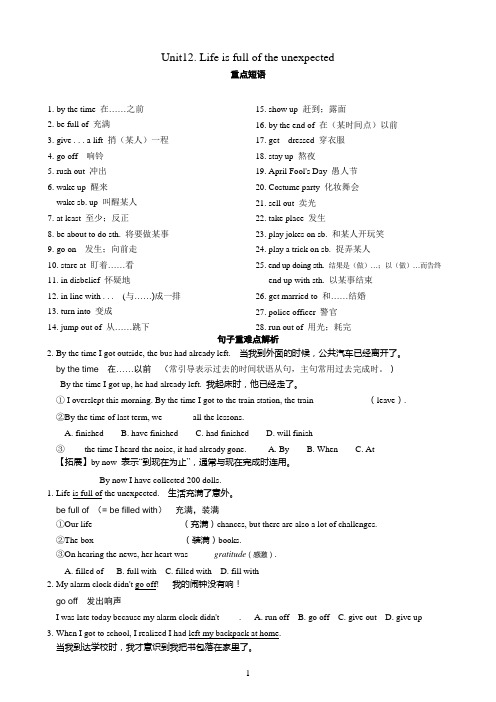
Unit12. Life is full of the unexpected重点短语句子重难点解析2. By the time I got outside, the bus had already left.当我到外面的时候,公共汽车已经离开了。
by the time 在……以前(常引导表示过去的时间状语从句,主句常用过去完成时。
)By the time I got up, he had already left. 我起床时,他已经走了。
① I overslept this morning. By the time I got to the train station, the train ____________(leave).②By the time of last term, we ______ all the lessons.A. finishedB. have finishedC. had finishedD. will finish③____ the time I heard the noise, it had already gone. A. By B. When C. At【拓展】by now 表示“到现在为止”,通常与现在完成时连用。
By now I have collected 200 dolls.1. Life is full of the unexpected.生活充满了意外。
be full of (= be filled with)充满,装满①Our life ____________________(充满)chances, but there are also a lot of challenges.②The box ____________________(装满)books.③On hearing the news, her heart was _____ gratitude(感激).A. filled ofB. full withC. filled withD. fill with2. My alarm clock didn't go off! 我的闹钟没有响!go off发出响声I was late today because my alarm clock didn't ____. A. run off B. go off C. give out D. give up3. When I got to school, I realized I had left my backpack at home.当我到达学校时,我才意识到我把书包落在家里了。
新版新目标九年级Unit 12 Life is full of the unexpected.课文知识点详解

语法过去完成时1.过去完成时定义:过去完成时表示在过去某个时间或某个动作之前发生的动作或存在的状态,它表示动作发生的时间是‘过去的过去’,它是一种相对于一般过去时的时态,没有一般过去时就改有过去完成时。
先发生后发生过去的过去过去某时现在将来过去完成时从过去之前的某个时间点了、列过去的某个时间点为止2.构成:过去完成时的谓语由‘助动词had+过去分词’,否定式:had not+过去分词,(hadn’t)3.过去完成时的用法:(1)表示一个动作或状态在过去某一时间成动作之前已经完成,即发生在‘过去的过去’这个过去的时间可以用by,before等介词短语或者一个时间状语从句来表示. Eg: we had planted euer loo trees by yesterday.(2)表示某一动作或状态,在过去某时之前已经开始,一直延续到这一过去的时间。
常与表示延续的时间状语连用。
Eg: By the end of last year,she had worked in the factory for twenty years.4.过去完成时的判断依据(1)由时间状语来判定,一般说来,各种时间都有特定的时间状语,与过去完成时连用的时间状语有①by+过去时间点Eg: she had finished rending the book by q o’clock yesterday morning.②by the end of+过去的时间. Eg: we had learned over two thousand English words by the end of last term.(2)由‘过去的过去’来判断:过去完成时表示‘过去的过去’指在过去某一动作或状态之前,已经发生或完成的动作或状态,即动作或状态,有先后关系,动作或状态在前的用过去完成时,在后的用一般过去式时,这种用法常出现在:①含有宾语从句的复合句中:当主语为一般过去时,且从句的动作发生时,从句要用过去完成时。
人教版新目标九年级全一册英语 Unit 12 知识点考点复习提纲
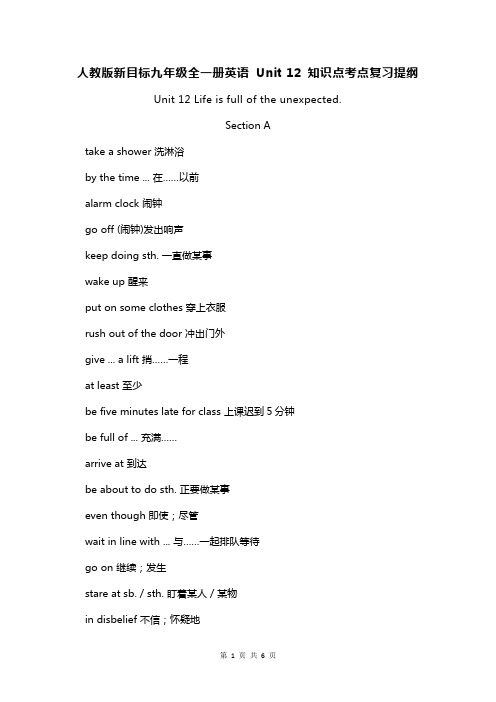
人教版新目标九年级全一册英语Unit 12 知识点考点复习提纲Unit 12 Life is full of the unexpected.Section Atake a shower 洗淋浴by the time ... 在……以前alarm clock 闹钟go off (闹钟)发出响声keep doing sth. 一直做某事wake up 醒来put on some clothes 穿上衣服rush out of the door 冲出门外give ... a lift 捎……一程at least 至少be five minutes late for class 上课迟到5分钟be full of ... 充满……arrive at 到达be about to do sth. 正要做某事even though 即使;尽管wait in line with ... 与……一起排队等待go on 继续;发生stare at sb. / sth. 盯着某人 / 某物in disbelief 不信;怀疑地jump out of bed 从床上跳下来go straight to the airport 直奔机场miss my plane 误了航班think to oneself 心中想;盘算wait till the next day 等到第二天hear about 听说the day before 前一天turn into 变成show up 露面;赶到by the end of 在(某时间点)以前Section B get dressed 穿上衣服costume party 化装舞会stay up all night 整晚熬夜April Fool’s Day 愚人节an introduction to ... 对……的介绍take place 发生local supermarkets 当地的超市sell out 卖光lose weight 减肥find out 弄清;查明end up doing sth. 以做某事告终get married 结婚cancel his show 取消他的节目hundreds of 成百上千的;数以百计的thousands of 成千上万的;数以千计的police officers 警官rush to ... 匆忙去……more than 超过;多于run away from 逃离on the first day of school 在上学第一天turn around 转向;回转hand in 上交【重点句型】1. By the time I got up, my brother had already gotten in the shower. 当我起床时,我哥哥已经进了浴室了。
(word完整版)人教版新目标九年级英语Unit12知识点及练习(无答案),推荐文档

Unit12 Life is full of the unexpected.知识点及练习Secti on A1. Life is full of the un expected. 生活充满了意外。
be full of = be filled with 充满,装满unexpected adj.出乎意料的;始料不及的the unexpected 意外的事情”出乎意料的事”。
the + adj.表示一类人或事物。
英语中,有些形容词与定冠词the连用,表示一类人或事物,在句子中起名词的作用。
the homeless 无家可归者the disabled 残疾人expect v.期望,预期expect to do sth.期望做某事expect sb. to do sth.期望某人做某事2. by the time在... 以前,指从过去的某一点到从句所示的时间为止,常引导表示过去的时间状语从句,主句常用过去完成时,即had+动词过去分词。
3. leave 与forget 的用法:1)leave 遗留,落下,忘记带”,侧重指把某物或某人留在某个地方,后常跟地点状语;英语中表示把某物遗忘在某处"常用leave +地点。
(1)leave sth. +地点把某物遗忘在某地(2)leave for +地点离开去某地(3)leave a message 留言ask for leave 请假leave school (中学)毕业(4)leave one by oneself=leave sb. alone 把某人单独留下2)forget 忘?己”,侧重指忘记某件事情,后常跟to do (忘了要去做)或doing (忘了做过)。
forget T forgot 宀forgotten 忘记;(1)forget sth 忘记某事(不能跟地点状语连用)He forgot his grandfather ' s name.(2)forget to do sth忘记去做某事(未做)⑶forget doing sth忘记做过某事(已做)4. give sb. a lift =give sb. a ride / give a ride to sb. 捎某人一程5. be about to即将做某事;正要做某事侧重于表示动作马上就要发生,常与when引导的从句连用,但不与具体的时间状语连用。
人教版英语九年级全册Unit12知识点归纳讲解和写作指导

Unit12 知识点归纳讲解和写作指导重点知识归纳Section Atake a shower洗淋浴by the time ...在... 以前alarm clock 闹钟go off (闹钟)发出响声keep doing sth. 一直做某事wake up 醒来put on some clothes穿上衣服rush out of the door 冲出门夕卜give ... a lift 捎... 一程at least 至少be five minutes late for class上课迟至U 5 分钟be full of ...充满...arrive at 至达be about to do sth.正要做某事eve n though即使;尽管wait in line with ... 与.... 一起排队等待go on 继续;发生stare at sb. / sth盯着某人/某物in disbelief 不信;怀疑地jump out of bed 从床上跳下来go straight to the airport 直奔机场miss my pla ne 误了航班think to oneself 心中想;盘算wait till the next day 等至第二天hear about 听说the day before 前一天turn into 变成show up 露面;赶到by the end of在(某时间点)以前Section Bget dressed穿上衣服costume party化装舞会stay up all night 整晚熬夜April Fool ' san in troduct ion to ...对.. 的介绍take place 发生local supermarkets当地的超市sell out 卖光lose weight 减肥find out 弄清;查明end up doi ng sth .以做某事告终get married 结婚cancel his show取消他的节目hun dreds of成百上千的;数以百计的thousa nds of成千上万的;数以千计的police officers 警官rush to ...匆忙去...more tha n超过;多于run away from 逃离on the first day of school 在上学第一天turn around 转向;回转hand in 上交重点知识点讲解1. alive 作形容词,意为“活着;有生气的”,在句中可作表语、后置定语或宾语补足语。
- 1、下载文档前请自行甄别文档内容的完整性,平台不提供额外的编辑、内容补充、找答案等附加服务。
- 2、"仅部分预览"的文档,不可在线预览部分如存在完整性等问题,可反馈申请退款(可完整预览的文档不适用该条件!)。
- 3、如文档侵犯您的权益,请联系客服反馈,我们会尽快为您处理(人工客服工作时间:9:00-18:30)。
Unit12 Life is full of the unexpected.
【重点短语】
1. take a shower 淋浴
2. leave my backpack at home 把背包忘在家里
3. get back to school 返回学校
4. start teaching 开始教学
5. go off 响铃
6. rush out the door 冲出房门
7. give sb a lift 捎某人一程
8. miss both events 错过两个事件
9. be about to do sth 正要做某事
10. stare in disbelief at 难以置信地盯着
11. raise above the burning building 从正在燃烧的楼上升起
12. jump out of bed 跳下床
13. collect the math homework 收数学作业
14. show up 赶到,出现
【重点句型】
1. By the time I got up, my brother had already gotten in the shower. 当我起床时,我哥哥已经进了浴室了。
2. By the time I got outside, the bus had already gone. 当我出来时,公汽已经走了。
3. When I got to school, I realized I had left my backpack at home. 当我到达学校时,我才意识到我把背包忘在家里了。
4. By the time I walked into class, the teacher had started teaching already. 当我走进教室时,老师已经开始讲课了。
5. By the time I arrived at the party, everyone else had already showed up. 当我到达晚会时,其他的每个人都已经到了。
6. When he put the noodles into the bowl, he realized he had forgotten to add the green beans. 当他把面条放进碗里时,他意识到他忘了添加绿豆荚了。
7. Before she got a chance to say goodbye, he had gone into the building. 在她得到一个向他告别的机会之前,他已经进入楼房了。
【考点详解】
1. By the time I got outside, the bus had already left. 当我出来的时候,公共汽车已经走了。
by the time作连词引导时间状语从句,当从句用一般过去时,主句用过去完成时;当从句用一般现在时,主句用一般将来时或将来完成时。
如:By the time he was ten, Tom had built a chemistry lab himself. 等到了十岁的时候,汤姆自己建了一个化学实验室。
I’ll be in bed by the time you get home. 你到家时,我已经上床睡觉了。
2. When she got to school, she realized she had left her backpack at home. 当她到学校时,她意识到她把背包忘在家里了。
表示“把某物忘在某处”要用词组leave sth in/on/at...
如:I've left my umbrella at home. 我把伞忘在家里了。
I left my book on the desk. 我把书忘在桌子上。
forget意为“遗忘某物”,指忘记一件具体的东西,但不能有具体的地点。
如:I forgot my umbrella yesterday. 我昨天忘了带伞。
Don't forget the cases. 别忘了带箱子。
3. Last Friday night, my friend invited me to his birthday party.
上周五晚上,我朋友邀请我参加他的生日晚会。
invite sb. to a place(或一活动、聚会)意为“邀请某人到某一地方或参加某一活动”;而invite sb to do sth. 意为“邀请某人做某事”。
如:I think we have many friends now, and we must invite them to our place. 我想我们现在有很多朋友了,我们也应该邀请他们到我们家做客。
Kitty’s teacher Mr Wu in vited me to join their school trip to the World Park. 基蒂的老师吴老师邀请我参加了去世界公园的学校郊游活动。
4. Wells made it sound so real that hundreds of people believed the story and fear spread across the whole country.
威尔斯讲述这个新闻起来如此的真实,以致成百上千的人都相信了这个故事,进而引发了全国性的恐慌。
so…that...在此引导结果状语从句,so后面应加一个形容词或副词,意为“如此……以至于……”。
如:This book is so interesting that everyone in our class wants to read it. 这本书是如此的有趣以至于全班同学都想看看。
(so+形容词)
He ran so fast that I couldn't catch up with him. 他跑得那么快,以至于我跟不上他。
(so +副词)
【重点语法】
比较一般过去时和现在完成时的异同
1. 共同点:动作都是在过去完成。
I saw the film yesterday evening.
I have seen the film before.
(看电影这件事都是在过去完成的。
)
2. 区别:
①现在完成时强调过去发生的动作对现在的影响和结果,而一般过去时与现在没有联系,只是说明某个动作发生的时间是在过去。
②一般过去时通常与具体明确的过去时间状语连用。
如yesterday, last week , two years ago,just now,in 2002 等;而现在完成时则常与just ,already ,ever ,never 等模糊的过去时间状语和these days ,this week ,since..., for... 等表示一段时间的状语连用。
